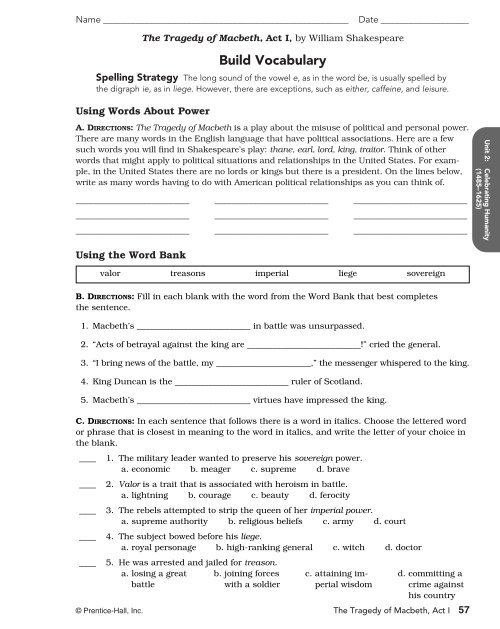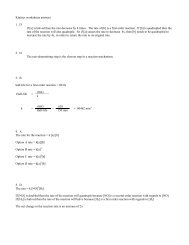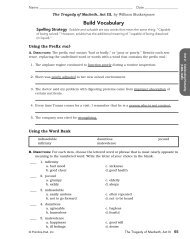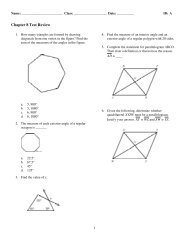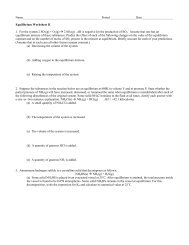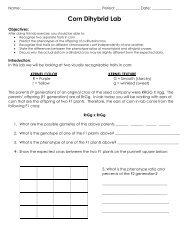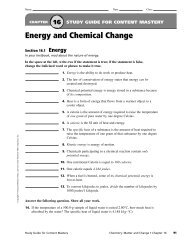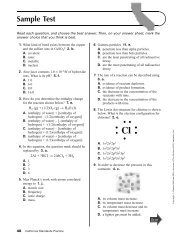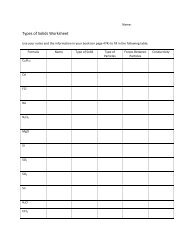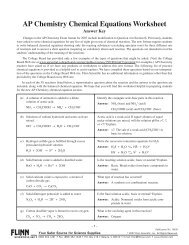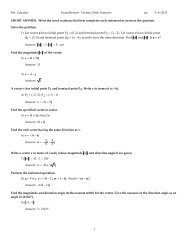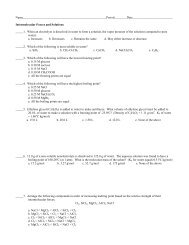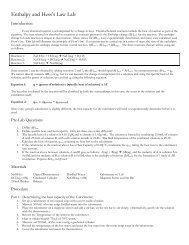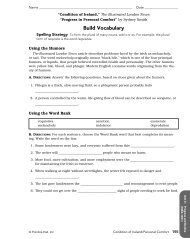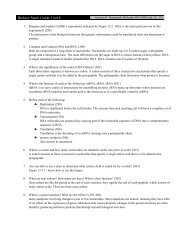Selection Support: Skills Development Workbook: Unit 2: The ...
Selection Support: Skills Development Workbook: Unit 2: The ...
Selection Support: Skills Development Workbook: Unit 2: The ...
Create successful ePaper yourself
Turn your PDF publications into a flip-book with our unique Google optimized e-Paper software.
Name _____________________________________________________Date ___________________<strong>The</strong> Tragedy of Macbeth, Act I, by William ShakespeareBuild VocabularySpelling Strategy <strong>The</strong> long sound of the vowel e, as in the word be, is usually spelled bythe digraph ie, as in liege. However, there are exceptions, such as either, caffeine, and leisure.Using Words About PowerA. DIRECTIONS: <strong>The</strong> Tragedy of Macbeth is a play about the misuse of political and personal power.<strong>The</strong>re are many words in the English language that have political associations. Here are a fewsuch words you will find in Shakespeare’s play: thane, earl, lord, king, traitor. Think of otherwords that might apply to political situations and relationships in the <strong>Unit</strong>ed States. For example,in the <strong>Unit</strong>ed States there are no lords or kings but there is a president. On the lines below,write as many words having to do with American political relationships as you can think of.___________________________ ___________________________ ______________________________________________________ ___________________________ ______________________________________________________ ___________________________ ___________________________<strong>Unit</strong> 2: Celebrating Humanity(1485–1625)Using the Word Bankvalor treasons imperial liege sovereignB. DIRECTIONS: Fill in each blank with the word from the Word Bank that best completesthe sentence.1. Macbeth’s ___________________________ in battle was unsurpassed.2. “Acts of betrayal against the king are ___________________________!” cried the general.3. “I bring news of the battle, my _______________________,” the messenger whispered to the king.4. King Duncan is the ___________________________ ruler of Scotland.5. Macbeth’s ___________________________ virtues have impressed the king.C. DIRECTIONS: In each sentence that follows there is a word in italics. Choose the lettered wordor phrase that is closest in meaning to the word in italics, and write the letter of your choice inthe blank.____ 1. <strong>The</strong> military leader wanted to preserve his sovereign power.a. economic b. meager c. supreme d. brave____ 2. Valor is a trait that is associated with heroism in battle.a. lightning b. courage c. beauty d. ferocity____ 3. <strong>The</strong> rebels attempted to strip the queen of her imperial power.a. supreme authority b. religious beliefs c. army d. court____ 4. <strong>The</strong> subject bowed before his liege.a. royal personage b. high-ranking general c. witch d. doctor____ 5. He was arrested and jailed for treason.a. losing a great b. joining forces c. attaining im- d. committing abattle with a soldier perial wisdom crime againsthis country© Prentice-Hall, Inc. <strong>The</strong> Tragedy of Macbeth, Act I 57
Name _____________________________________________________Date ___________________<strong>The</strong> Tragedy of Macbeth, Act I, by William ShakespeareGrammar and Style: Action Verbs and Linking VerbsAction verbs express physical or mental action. Linking verbs connect the subject of a sentencewith a complement that either renames or modifies the subject. Linking verbs includeforms of be, seem, taste, sound, look, become, appear, feel, and smell.Action verbs: “Who was the thane lives yet,But under heavy judgment bears that lifeWhich he deserves to lose.”Linking verbs: “<strong>The</strong> rest is labor, which is not used for you.I’ll be myself the harbinger, . . .”A. Practice: Each of the quotations below is from <strong>The</strong> Tragedy of Macbeth. Underline the actionverbs and circle the linking verbs.1. But in a sieve I’ll thither sail, 5. . . . He bade me, from him, call thee Thane of Cawdor;And like a rat without a tailIn which addition, hail, most worthy Thane!I’ll do, I’ll do, I’ll do.For it is thine.2. Hover through the fog and filthy air. 6. <strong>The</strong> sin of my ingratitude even nowWas heavy on me: thou art so far before,That swiftest wing of recompense is slowTo overtake thee.3. Live you, or are you aught 7. <strong>The</strong> King comes here tonight.That man may question?4. Speak if you can: what are you?B. Writing Application: If the underlined verb in each sentence is an action verb, rewrite thesentence using a linking verb. If the underlined verb is a linking verb, rewrite the sentence usingan action verb.Example: Macbeth speaks of his unhappiness. (action verb)Rewritten: Macbeth seems unhappy or Macbeth is unhappy.1. Lady Macbeth sees a way to make her husband king.2. <strong>The</strong> witches are evil.3. King Duncan trusts Macbeth completely.4. Duncan’s sons look guilty.5. Macbeth wants the crown for himself.58 <strong>Selection</strong> <strong>Support</strong> © Prentice-Hall, Inc.
Name _____________________________________________________Date ___________________<strong>The</strong> Tragedy of Macbeth, Act I, by William ShakespeareReading Strategy: Using Text AidsPlaywrights use stage directions to help readers, actors, and directors understand how aplay should look when it is staged. Stage directions can give play readers hints about mood,setting, movement, and characters’ intentions. For example, look at the opening stage directionsof <strong>The</strong> Tragedy of Macbeth:An open place.[Thunder and lightning. Enter THREE WITCHES.]With very few words William Shakespeare has told you a great deal about the play you areabout to read.1. Where does the scene take place?In “An open place,” a place where there are no trees, hills, or houses.2. What is going on at this place?“Thunder and lightning.” <strong>The</strong> weather is bad, and the mood is a little frightening.<strong>Unit</strong> 2: Celebrating Humanity(1485–1625)3. Who is in the scene?“Three witches enter.” Right away, the reader can tell that something strange is aboutto happen.DIRECTIONS: Stage directions can guide the reader to a better understanding of a play’s action.Use a graphic organizer like this one to help you pick up hints from the stage directions.Act/SceneCharactersSettingSpecific ActionAct I, Scene iThree witchesAn open placeThunder and lightning.Three witches enter.Notes in the margin of <strong>The</strong> Tragedy of Macbeth and other plays provide another useful tool toaid you in your reading. To get more from what you read, it’s a good idea to see if you can figureout an annotated term or expression before you look at the margin note. Usually the context ofthe play provides clues to the meaning. Look at the following lines from <strong>The</strong> Tragedy of Macbeth:MALCOLM. . . . He diedAs one that had been studied 3 in his death,To throw away the dearest thing he owed 4As ’twere a careless 5 trifle.<strong>The</strong> lines may seem confusing at first. But if you look at the context, you will find hintsabout the meaning. <strong>The</strong> context makes it clear that Malcolm is praising the Thane of Cawdorfor the noble way in which he died. According to Malcolm, the Thane’s death turned out to behis greatest achievement. Knowing this, when you read “He died / As one that had been studiedin his death,” you might be able to guess that studied means “prepared for” or “rehearsed.”<strong>The</strong>n, to check your interpretation, look at the margin note.© Prentice-Hall, Inc. <strong>The</strong> Tragedy of Macbeth, Act I 59
Name _____________________________________________________Date ___________________<strong>The</strong> Tragedy of Macbeth, Act I, by William ShakespeareLiterary Analysis: Elizabethan DramaIn the years before Elizabeth I came to power in England, troupes of actors traveled the Englishcountryside performing religious plays. <strong>The</strong>y performed wherever they could: in the courtyardsof inns, in town squares, and in open areas on the outskirts of villages. Many of the playsthey presented were based on biblical stories.During the Elizabethan period, the style of English drama changed radically. Permanent theaterswere built, giving actors not only an artistic home, but also the luxury of perfecting certainaspects of presentation. Plays began to veer away from religious themes. Instead, audiencesfound themselves watching plays about familiar problems and events. Playwrights usedpoetic language and rich imagery to tell a wide variety of stories—from dramas about tragic figuresto comedies about hapless lovers. This kind of theater, with its nonreligious entertainmentvalue, became very popular. Audiences loved watching plays about characters with motivationsand feelings they could understand. <strong>The</strong>y came to the theater to laugh and cry and to see theirown lives mirrored in the stories of others.DIRECTIONS: Answer the following questions about Act I of <strong>The</strong> Tragedy of Macbeth.1. What might the three witches represent to an audience used to watching plays with religiousthemes?2. In what ways might the content of the following speech be said to echo the religious sentimentsof Shakespeare’s audience?. . . But I have spokeWith one that saw him die, who did reportThat very frankly he confessed his treasons,Implored your Highness’ pardon and set forthA deep repentance . . .3. In the following speech, what is Lady Macbeth saying about her husband’s character? Howmight such sentiments about Macbeth win an audience’s sympathy?Glamis thou art, and Cawdor, and shalt beWhat thou art promised. Yet do I fear thy nature;It is too full o’ the milk of human kindnessTo catch the nearest way. Thou wouldst be great,Art not without ambition, but without<strong>The</strong> illness should attend it. . . .60 <strong>Selection</strong> <strong>Support</strong> © Prentice-Hall, Inc.


